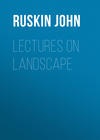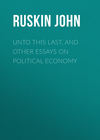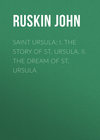Czytaj książkę: «On the Old Road Vol. 1 (of 2)», strona 24
81. You may either do this—which, if you can, it will generally be very advisable to do—or, on the other hand, you may cover the face with innumerable scratches, and let your hand play with wanton freedom, until the graceful scrabble concentrates itself into shade. You may soften—efface—retouch—rebite—dot, and hatch, and redefine. If you are a great master, you will soon get your character, and probably keep it (Rembrandt often gets it at first, nearly as securely as Dürer); but the design of it will be necessarily seen through loose work, and modified by accident (as you think) fortunate. The accidents which occur to a practiced hand are always at first pleasing—the details which can be hinted, however falsely, through the gathering mystery, are always seducing. You will find yourself gradually dwelling more and more on little meannesses of form and texture, and lusters of surface: on cracks of skin, and films of fur and plume. You will lose your way, and then see two ways, and then many ways, and try to walk a little distance on all of them in turn, and so, back again. You will find yourself thinking of colors, and vexed because you cannot imitate them; next, struggling to render distances by indecision, which you cannot by tone. Presently you will be contending with finished pictures; laboring at the etching, as if it were a painting. You will leave off, after a whole day's work (after many days' work if you choose to give them), still unsatisfied. For final result—if you are as great as Rembrandt—you will have most likely a heavy, black, cloudy stain, with less character in it than the first ten lines had. If you are not as great as Rembrandt, you will have a stain by no means cloudy; but sandy and broken,—instead of a face, a speckled phantom of a face, patched, blotched, discomfited in every texture and form—ugly, assuredly; dull, probably; an unmanageable and manifold failure ill concealed by momentary, accidental, undelightful, ignoble success.
Undelightful; note this especially, for it is the peculiar character of etching that it cannot render beauty. You may hatch and scratch your way to picturesqueness or to deformity—never to beauty. You can etch an old woman, or an ill-conditioned fellow. But you cannot etch a girl—nor, unless in his old age, or with very partial rendering of him, a gentleman.
82. And thus, as farther belonging to, and partly causative of, their choice of means, there is always a tendency in etchers to fasten on unlovely objects; and the whole scheme of modern rapid work of this kind is connected with a peculiar gloom which results from the confinement of men, partially informed, and wholly untrained, in the midst of foul and vicious cities. A sensitive and imaginative youth, early driven to get his living by his art, has to lodge, we will say, somewhere in the by-streets of Paris, and is left there, tutorless, to his own devices. Suppose him also vicious or reckless, and there need be no talk of his work farther; he will certainly do nothing in a Düreresque manner. But suppose him self-denying, virtuous, full of gift and power—what are the elements of living study within his reach? All supreme beauty is confined to the higher salons. There are pretty faces in the streets, but no stateliness nor splendor of humanity; all pathos and grandeur is in suffering; no purity of nature is accessible, but only a terrible picturesqueness, mixed with ghastly, with ludicrous, with base concomitants. Huge walls and roofs, dark on the sunset sky, but plastered with advertisement bills, monstrous-figured, seen farther than ever Parthenon shaft, or spire of Sainte Chapelle. Interminable lines of massy streets, wearisome with repetition of commonest design, and degraded by their gilded shops, wide-fuming, flaunting, glittering, with apparatus of eating or of dress. Splendor of palace-flank and goodly quay, insulted by floating cumber of barge and bath, trivial, grotesque, indecent, as cleansing vessels in a royal reception room. Solemn avenues of blossomed trees, shading puppet-show and baby-play; glades of wild-wood, long withdrawn, purple with faded shadows of blood; sweet windings and reaches of river far among the brown vines and white orchards, checked here by the Ile Notre Dame, to receive their nightly sacrifice, and after playing with it among their eddies, to give it up again, in those quiet shapes that lie on the sloped slate tables of the square-built Temple of the Death-Sibyl, who presides here over spray of Seine, as yonder at Tiber over spray of Anio. Sibylline, indeed, in her secrecy, and her sealing of destinies, by the baptism of the quick water-drops which fall on each fading face, unrecognized, nameless in this Baptism forever. Wreathed thus throughout, that Paris town, with beauty, and with unseemly sin, unseemlier death, as a fiend-city with fair eyes; forever letting fall her silken raiment so far as that one may "behold her bosom and half her side." Under whose whispered teaching, and substitution of "Contes Drolatiques" for the tales of the wood fairy, her children of Imagination will do, what Gérôme and Gustave Doré are doing, and her whole world of lesser Art will sink into shadows of the street and of the boudoir-curtain, wherein the etching point may disport itself with freedom enough.74
83. Nor are we slack in our companionship in these courses. Our imagination is slower and clumsier than the French—rarer also, by far, in the average English mind. The only man of power equal to Doré's whom we have had lately among us, was William Blake, whose temper fortunately took another turn. But in the calamity and vulgarity of daily circumstance, in the horror of our streets, in the discordance of our thoughts, in the laborious looseness and ostentatious cleverness of our work, we are alike. And to French faults we add a stupidity of our own; for which, so far as I may in modesty take blame for anything, as resulting from my own teaching, I am more answerable than most men. Having spoken earnestly against painting without thinking, I now find our exhibitions decorated with works of students who think without painting; and our books illustrated by scratched wood-cuts, representing very ordinary people, who are presumed to be interesting in the picture, because the text tells a story about them. Of this least lively form of modern sensational work, however, I shall have to speak on other grounds; meantime, I am concerned only with its manner; its incontinence of line and method, associated with the slightness of its real thought, and morbid acuteness of irregular sensation; ungoverned all, and one of the external and slight phases of that beautiful Liberty which we are proclaiming as essence of gospel to all the earth, and shall presently, I suppose, when we have had enough of it here, proclaim also to the stars, with invitation to them out of their courses.
84. "But you asked us for 'free-heart' outlines, and told us not to be slaves, only thirty days ago."75
Inconsistent that I am! so I did. But as there are attractions, and attractions; originalities, and originalities, there are liberties, and liberties. Yonder torrent, crystal-clear, and arrow-swift, with its spray leaping into the air like white troops of fawns, is free, I think. Lost, yonder, amidst bankless, boundless marsh—soaking in slow shallowness, as it will, hither and thither, listless, among the poisonous reeds and unresisting slime—it is free also. You may choose which liberty you will, and restraint of voiceful rock, or the dumb and edgeless shore of darkened sand. Of that evil liberty, which men are now glorifying,—and of its opposite continence—which is the clasp and χρυσἑη περὁνι of Aglaia's cestus—we will try to find out something in next chapter.76
Chapter VII. 77
85. In recommencing this series of papers, I may perhaps take permission briefly to remind the reader of the special purpose which my desultory way of writing, (of so vast a subject I find it impossible to write otherwise than desultorily), may cause him sometimes to lose sight of; the ascertainment, namely, of some laws for present practice of Art in our schools, which may be admitted, if not with absolute, at least with a sufficient consent, by leading artists.
There are indeed many principles on which different men must ever be at variance; others, respecting which it may be impossible to obtain any practical consent in certain phases of particular schools. But there are a few, which, I think, in all times of meritorious Art, the leading painters would admit; and others which, by discussion, might be arrived at, as, at all events, the best discoverable for the time.
86. One of those which I suppose great workmen would always admit, is, that, whatever material we use, the virtues of that material are to be exhibited, and its defects frankly admitted; no effort being made to conquer those defects by such skill as may make the material resemble another. For instance, in the dispute so frequently revived by the public, touching the relative merits of oil color and water color; I do not think a great painter would ever consider it a merit in a water color to have the "force of oil." He would like it to have the peculiar delicacy, paleness, and transparency belonging specially to its own material. On the other hand, I think he would not like an oil painting to have the deadness or paleness of a water color. He would like it to have the deep shadows, and the rich glow, and crumbling and bossy touches which are alone attainable in oil color. And if he painted in fresco, he would neither aim at the transparency of water color, nor the richness of oil; but at luminous bloom of surface, and dignity of clearly visible form. I do not think that this principle would be disputed by artists of great power at any time, or in any country; though, if by mischance they had been compelled to work in one material, while desiring the qualities only attainable in another, they might strive, and meritoriously strive, for those better results, with what they had under their hand. The change of manner in William Hunt's work, in the later part of his life, was an example of this. As his art became more developed, he perceived in his subjects qualities which it was impossible to express in a transparent medium; and employed opaque white to draw with, when the finer forms of relieved light could not be otherwise followed. It was out of his power to do more than this, since in later life any attempt to learn the manipulation of oil color would have been unadvisable; and he obtained results of singular beauty; though their preciousness and completion would never, in a well-founded school of Art, have been trusted to the frail substance of water color.
87. But although I do not suppose that the abstract principle of doing with each material what it is best fitted to do, would be, in terms, anywhere denied; the practical question is always, not what should be done with this, or that, if everything were in our power; but what can be, or ought to be, accomplished with the means at our disposal, and in the circumstances under which we must necessarily work. Thus, in the question immediately before us, of the proper use of the black line—it is easy to establish the proper virtue of Line work, as essentially "De-Lineation," the expressing by outline the true limits of forms, which distinguish and part them from other forms; just as the virtue of brush work is essentially breadth, softness, and blending of forms. And, in the abstract, the point ought not to be used where the aim is not that of definition, nor the brush to be used where the aim is not that of breadth. Every painting in which the aim is primarily that of drawing, and every drawing in which the aim is primarily that of painting, must alike be in a measure erroneous. But it is one thing to determine what should be done with the black line, in a period of highly disciplined and widely practiced art, and quite another thing to say what should be done with it, at this present time, in England. Especially, the increasing interest and usefulness of our illustrated books render this an inquiry of very great social and educational importance. On the one side, the skill and felicity of the work spent upon them, and the advantage which young readers, if not those of all ages, might derive from having examples of good drawing put familiarly before their eyes, cannot be overrated; yet, on the other side, neither the admirable skill nor free felicity of the work can ultimately be held a counterpoise for the want—if there be a want—of sterling excellence: while, farther, this increased power of obtaining examples of art for private possession, at an almost nominal price, has two accompanying evils: it prevents the proper use of what we have, by dividing the attention, and continually leading us restlessly to demand new subjects of interest, while the old are as yet not half exhausted; and it prevents us—satisfied with the multiplication of minor art in our own possession—from looking for a better satisfaction in great public works.
88. Observe, first, it prevents the proper use of what we have. I often endeavor, though with little success, to conceive what would have been the effect on my mind, when I was a boy, of having such a book given me as Watson's "Illustrated Robinson Crusoe."78 The edition I had was a small octavo one, in two volumes, printed at the Chiswick Press in 1812. It has, in each volume, eight or ten very rude vignettes, about a couple of inches wide; cut in the simple, but legitimate, manner of Bewick, and, though wholly commonplace and devoid of beauty, yet, as far as they go, rightly done; and here and there sufficiently suggestive of plain facts. I am quite unable to say how far I wasted,—how far I spent to advantage,—the unaccountable hours during which I pored over these wood-cuts; receiving more real sensation of sympathetic terror from the drifting hair and fear-stricken face of Crusoe dashed against the rock, in the rude attempt at the representation of his escape from the wreck, than I can now from the highest art; though the rocks and water are alike cut only with a few twisted or curved lines, and there is not the slightest attempt at light and shade, or imitative resemblance. For one thing, I am quite sure that being forced to make all I could out of very little things, and to remain long contented with them, not only in great part formed the power of close analysis in my mind, and the habit of steady contemplation; but rendered the power of greater art over me, when I first saw it, as intense as that of magic; so that it appealed to me like a vision out of another world.
89. On the other hand this long contentment with inferior work, and the consequent acute enjoyment of whatever was the least suggestive of truth in a higher degree, rendered me long careless of the highest virtues of execution, and retarded by many years the maturing and balancing of the general power of judgment. And I am now, as I said, quite unable to imagine what would have been the result upon me, of being enabled to study, instead of these coarse vignettes, such lovely and expressive work as that of Watson; suppose, for instance, the vignette at p. 87, which would have been sure to have caught my fancy, because of the dog, with its head on Crusoe's knee, looking up and trying to understand what is the matter with his master. It remains to be seen, and can only be known by experience, what will actually be the effect of these treasures on the minds of children that possess them. The result must be in some sort different from anything yet known; no such art was ever yet attainable by the youth of any nation. Yet of this there can, as I have just said, be no reasonable doubt;—that it is not well to make the imagination indolent, or take its work out of its hands by supplying continual pictures of what might be sufficiently conceived without pictures.
90. Take, for instance, the preceding vignette, in the same book, "Crusoe looking at the first shoots of barley." Nothing can be more natural or successful as a representation; but, after all, whatever the importance of the moment in Crusoe's history, the picture can show us nothing more than a man in a white shirt and dark pantaloons, in an attitude of surprise; and the imagination ought to be able to compass so much as this without help. And if so laborious aid be given, much more ought to be given. The virtue of Art, as of life, is that no line shall be in vain. Now the number of lines in this vignette, applied with full intention of thought in every touch, as they would have been by Holbein or Dürer, are quite enough to have produced,—not a merely deceptive dash of local color, with evanescent background,—but an entirely perfect piece of chiaroscuro, with its lights all truly limited and gradated, and with every form of leaf and rock in the background entirely right, complete,—and full not of mere suggestion, but of accurate information, exactly such as the fancy by itself cannot furnish. A work so treated by any man of power and sentiment such as the designer of this vignette possesses, would be an eternal thing; ten in the volume, for real enduring and educational power, were worth two hundred in imperfect development, and would have been a perpetual possession to the reader; whereas one certain result of the multiplication of these lovely but imperfect drawings, is to increase the feverish thirst for excitement, and to weaken the power of attention by endless diversion and division. This volume, beautiful as it is, will be forgotten; the strength in it is, in final outcome, spent for naught; and others, and still others, following it, will "come like shadows, so depart."
91. There is, however, a quite different disadvantage, but no less grave, to be apprehended from this rich multiplication of private possession. The more we have of books, and cabinet pictures, and cabinet ornaments, and other such domestic objects of art, the less capable we shall become of understanding or enjoying the lofty character of work noble in scale, and intended for public service. The most practical and immediate distinction between the orders of "mean" and "high" Art, is that the first is private,—the second public; the first for the individual, the second for all. It may be that domestic Art is the only kind which is likely to flourish in a country of cold climate, and in the hands of a nation tempered as the English are; but it is necessary that we should at least understand the disadvantage under which we thus labor; and the duty of not allowing the untowardness of our circumstances, or the selfishness of our dispositions, to have unresisted and unchecked influence over the adopted style of our art. But this part of the subject requires to be examined at length, and I must therefore reserve it for the following paper.
Chapter VIII. 79
92. In pursuing the question put at the close of the last paper, it must be observed that there are essentially two conditions under which we have to examine the difference between the effects of public and private Art on national prosperity. The first in immediate influence is their Economical function, the second their Ethical. We have first to consider what class of persons they in each case support; and, secondly, what classes they teach or please.
Looking over the list of the gift-books of this year, perhaps the first circumstance which would naturally strike us would be the number of persons living by this industry; and, in any consideration of the probable effects of a transference of the public attention to other kinds of work, we ought first to contemplate the result on the interests of the workman. The guinea spent on one of our ordinary illustrated gift-books is divided among—
1. A number of second-rate or third-rate artists, producing designs as fast as they can, and realizing them up to the standard required by the public of that year. Men of consummate power may sometimes put their hands to the business; but exceptionally.
2. Engravers, trained to mechanical imitation of this second or third-rate work; of these engravers the inferior classes are usually much overworked.
3. Printers, paper-makers, ornamental binders, and other craftsmen.
4. Publishers and booksellers.
93. Let us suppose the book can be remuneratively produced if there is a sale of five thousand copies. Then £5000, contributed for it by the public, are divided among the different workers; it does not matter what actual rate of division we assume, for the mere object of comparison with other modes of employing the money; but let us say these £5000 are divided among five hundred persons, giving on an average £10 to each. And let us suppose these £10 to be a fortnight's maintenance to each. Then, to maintain them through the year, twenty-five such books must be published; or to keep certainly within the mark of the probable cost of our autumnal gift-books, suppose £100,000 are spent by the public, with resultant supply of 100,000 households with one illustrated book, of second or third-rate quality each (there being twenty different books thus supplied), and resultant maintenance of five hundred persons for the year, at severe work of a second or third-rate order, mostly mechanical.
94. Now, if the mind of the nation, instead of private, be set on public work, there is of course no expense incurred for multiplication, or mechanical copying of any kind, or for retail dealing. The £5000, instead of being given for five thousand copies of the work, and divided among five hundred persons, are given for one original work, and given to one person. This one person will of course employ assistants; but these will be chosen by himself, and will form a superior class of men, out of whom the future leading artists of the time will rise in succession. The broad difference will therefore be, that, in the one case, £5000 are divided among five hundred persons of different classes, doing second-rate or wholly mechanical work; and in the other case, the same sum is divided among a few chosen persons of the best material of mind producible by the state at the given epoch. It may seem an unfair assumption that work for the public will be more honestly and earnestly done than that for private possession. But every motive that can touch either conscience or ambition is brought to bear upon the artist who is employed on a public service, and only a few such motives in other modes of occupation. The greater permanence, scale, dignity of office, and fuller display of Art in a National building, combine to call forth the energies of the artist; and if a man will not do his best under such circumstances, there is no "best" in him.
95. It might also at first seem an unwarrantable assumption that fewer persons would be employed in the private than in the national work, since, at least in architecture, quite as many subordinate craftsmen are employed as in the production of a book. It is, however, necessary, for the purpose of clearly seeing the effect of the two forms of occupation, that we should oppose them where their contrast is most complete; and that we should compare, not merely bookbinding with bricklaying, but the presentation of Art in books, necessarily involving much subordinate employment, with its presentation in statues or wall-pictures, involving only the labor of the artist and of his immediate assistants. In the one case, then, I repeat, the sum set aside by the public for Art-purposes is divided among many persons, very indiscriminately chosen; in the other among few carefully chosen. But it does not, for that reason, support fewer persons. The few artists live on their larger incomes,80 by expenditure among various tradesmen, who in no wise produce Art, but the means of pleasant life; so that the real economical question is, not how many men shall we maintain, but at what work shall they be kept?—shall they every one be set to produce Art for us, in which case they must all live poorly, and produce bad Art; or out of the whole number shall ten be chosen who can and will produce noble Art; and shall the others be employed in providing the means of pleasant life for these chosen ten? Will you have, that is to say, four hundred and ninety tradesmen, butchers, carpet-weavers, carpenters, and the like, and ten fine artists, or will you, under the vain hope of finding, for each of them within your realm, "five hundred good as he," have your full complement of bad draughtsmen, and retail distributors of their bad work?
96. It will be seen in a moment that this is no question of economy merely; but, as all economical questions become, when set on their true foundation, a dilemma relating to modes of discipline and education. It is only one instance of the perpetually recurring offer to our choice—shall we have one man educated perfectly, and others trained only to serve him, or shall we have all educated equally ill?—Which, when the outcries of mere tyranny and pride-defiant on one side, and of mere envy and pride-concupiscent on the other, excited by the peril and promise of a changeful time, shall be a little abated, will be found to be, in brief terms, the one social question of the day.
Without attempting an answer which would lead us far from the business in hand, I pass to the Ethical part of the inquiry; to examine, namely, the effect of this cheaply diffused Art on the public mind.
97. The first great principle we have to hold by in dealing with the matter is, that the end of Art is NOT to amuse; and that all Art which proposes amusement as its end, or which is sought for that end, must be of an inferior, and is probably of a harmful, class.
The end of Art is as serious as that of all other beautiful things—of the blue sky and the green grass, and the clouds and the dew. They are either useless, or they are of much deeper function than giving amusement. Whatever delight we take in them, be it less or more, is not the delight we take in play, or receive from momentary surprise. It might be a matter of some metaphysical difficulty to define the two kinds of pleasure, but it is perfectly easy for any of us to feel that there is generic difference between the delight we have in seeing a comedy and in watching a sunrise. Not but that there is a kind of Divina Commedia,—a dramatic change and power,—in all beautiful things: the joy of surprise and incident mingles in music, painting, architecture, and natural beauty itself, in an ennobled and enduring manner, with the perfectness of eternal hue and form. But whenever the desire of change becomes principal; whenever we care only for new tunes, and new pictures, and new scenes, all power of enjoying Nature or Art is so far perished from us: and a child's love of toys has taken its place. The continual advertisement of new music (as if novelty were its virtue) signifies, in the inner fact of it, that no one now cares for music. The continual desire for new exhibitions means that we do not care for pictures; the continual demand for new books means that nobody cares to read.
98. Not that it would necessarily, and at all times, mean this; for in a living school of Art there will always be an exceeding thirst for, and eager watching of freshly-developed thought. But it specially and sternly means this, when the interest is merely in the novelty; and great work in our possession is forgotten, while mean work, because strange and of some personal interest, is annually made the subject of eager observation and discussion. As long as (for one of many instances of such neglect) two great pictures of Tintoret's lie rolled up in an outhouse at Venice, all the exhibitions and schools in Europe mean nothing but promotion of costly commerce. Through that, we might indeed arrive at better things; but there is no proof, in the eager talk of the public about Art, that we are arriving at them. Portraiture of the said public's many faces, and tickling of its twice as many eyes, by changeful phantasm, are all that the patron-multitudes of the present day in reality seek; and this may be supplied to them in multiplying excess forever, yet no steps made to the formation of a school of Art now, or to the understanding of any that have hitherto existed.
99. It is the carrying of this annual Exhibition into the recesses of home which is especially to be dreaded in the multiplication of inferior Art for private possession. Public amusement or excitement may often be quite wholesomely sought, in gay spectacles, or enthusiastic festivals; but we must be careful to the uttermost how we allow the desire for any kind of excitement to mingle among the peaceful continuities of home happiness. The one stern condition of that happiness is that our possessions should be no more than we can thoroughly use; and that to this use they should be practically and continually put. Calculate the hours which, during the possible duration of life, can, under the most favorable circumstances, be employed in reading, and the number of books which it is possible to read in that utmost space of time;—it will be soon seen what a limited library is all that we need, and how careful we ought to be in choosing its volumes. Similarly, the time which most people have at their command for any observation of Art is not more than would be required for the just understanding of the works of one great master. How are we to estimate the futility of wasting this fragment of time on works from which nothing can be learned? For the only real pleasure, and the richest of all amusements, to be derived from either reading or looking, are in the steady progress of the mind and heart, which day by day are more deeply satisfied, and yet more divinely athirst.
100. As far as I know the homes of England of the present day, they show a grievous tendency to fall, in these important respects, into the two great classes of over-furnished and unfurnished:—of those in which the Greek marble in its niche, and the precious shelf-loads of the luxurious library, leave the inmates nevertheless dependent for all their true pastime on horse, gun, and croquet-ground;—and those in which Art, honored only by the presence of a couple of engravings from Landseer, and literature, represented by a few magazines and annuals arranged in a star on the drawing-room table, are felt to be entirely foreign to the daily business of life, and entirely unnecessary to its domestic pleasures.
"Cependant," dit Thomas, "on a vu des peintres de talent qui étaient partis de Paris après avoir exposé de bons tableaux et qui s'en revenaient classiquement ennuyeux. C'est done la faute de l'enseignement de l'Académie."
"Bah!" dit Gérard, "rien n'arrête le développement d'un homme puisqu'il comprend l'art, pourquoi ne fait-il pas d'art?"
"Parce qu'il gagne à peu près sa vie en faisant du commerce."
"On dirait que tu ne veux pas me comprendre, toi qui as justement passé par là. Comment faisais-tu quand tu étais compositeur d'une imprimerie?"
"Le soir," dit Thomas, "et le matin en hiver, à partir de quatre heures, je faisais des études à la lampe pendant deux heures, jusqu'au moment où j'allais à l'atelier."
"Et tu ne vivais pas de la peinture?"
"Je ne gagnais pas un sou."
"Bon!" dit Gérard; "tu vois bien que tu faisais du commerce en dehors de l'art et que cependant tu étudiais. Quand tu es sorti de l'imprimerie comment as-tu vécu?"
"Je faisais cinq ou six petites aquarelles par jour, que je vendais, sous les arcades de l'Institut, six sous pièce."
"Et tu en vivais; c'est encore du commerce. Tu vois done que ni l'imprimerie, ni les petits dessins, à cinq sous, ni la privation, ni la misère ne t'ont empêché d'arriver."
"Je ne suis pas arrivé."
"N'importe, tu arriveras certainement. . . . Si tu veux d'autres exemples qui prouvent que la misère et les autres piéges tendus sous nos pas ne doivent rien arrêter, tu te rappelles bien ce pauvre garçon dont vous admiriez les eaux-fortes, que vous mettiez aussi haut que Rembrandt, et qui aurait été lion, disiez-vous, s'il n'avait tant souffert de la faim. Qu'a-t-il fait le jour où il lui est tombé un petit héritage du ciel?"
"Il est vrai," dit Thomas, embarrassé; "qu'il a perdu tout son sentiment."
"Ce n'etait pas cependant une de ces grosses fortunes qui tuent un homme, qui le rendent lourd, fier et insolent: il avait juste de quoi vivre, six cents francs de rentes, une fortune pour lui, qui vivait avec cinq francs par mois. Il a continué à travailler; mais ses eaux-fortes n'étaient plus supportables; tandis qu'avant, il vivait avec un morceau de pain et des légumes; alors il avait du talent. Cela, Thomas, doit te prouver que ni les mauvais enseignements, ni les influences, ni la misère, ni la faim, ni la maladie, ne peuvent corrompre une nature bien douée. Elle souffre; mais trouve moi un grand artiste qui n'ait pas souffert. Il n'y a pas un seul homme de dénie heureux depuis que l'humanité existe."
"J'ai envie," dit Thomas, "de te faire cadeau d'une jolie cravate."
"Pourquoi?" dit Gérard.
"Parce que tu as bien parlé."












![Stones of Venice [introductions]](https://cdn.litres.ru/pub/c/cover_100/34843654.jpg)







